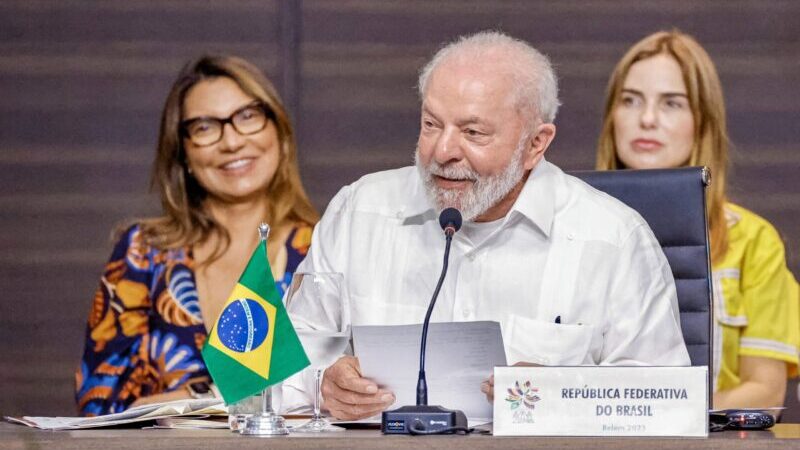Eight Amazon nations agreed to a list of unified policies and measures to bolster regional cooperation at a major rainforest summit in Brazil on Tuesday, but failed to agree on a common goal for ending deforestation.
Brazilian President Luiz Inacio Lula da Silva, who has staked his international reputation on improving Brazil’s environmental standing, had been pushing for the region to unite behind a common policy of ending deforestation by 2030 – one he has already adopted.
Instead, the joint declaration issued on Tuesday in the Brazilian city of Belem created an alliance for combating forest destruction, with countries left to pursue their own individual deforestation goals.
The document also leaves out any mentions to halting fossil fuel contracts in the Amazon rainforest, a proposal that was championed by the Colombian President Gustavo Petro but ultimately failed to make it into the final text.
The Brazilian coalition of climate NGOs, Climate Observatory, said the declaration fell short of expectations, adding the agreement “fails the rainforest and the planet”.
Pressure grows on governments and banks to stop supporting Amazon oil and gas
Slow action
The failure of the eight Amazon countries to agree on a pact to protect their own forests points to the larger, global difficulties at forging an agreement to combat climate change. Many scientists say policymakers are acting too slowly to head off catastrophic global warming.
Lula and other national leaders left Tuesday’s meeting without commenting on the declaration. Presidents from Bolivia, Brazil, Colombia and Peru attended the summit, while Ecuador, Guyana, Suriname and Venezuela sent other top officials.
Brazil’s Foreign Minister Mauro Vieira said in a press briefing that the issue of deforestation “in no way whatsoever will divide the region” and cited “an understanding about deforestation” in the declaration, without elaborating.
As Guyana shows, carbon offsets will not save the Amazon rainforest
This week’s summit brought together the Amazon Cooperation Treaty Organization (ACTO) for the first time in 14 years, with plans to reach a broad agreement on issues from fighting deforestation to financing sustainable development.
Márcio Astrini, executive secretary of the Brazilian NGO coalition Climate Observatory, said the summit’s declaration is a “first step” but added it still lacks “concrete responses to the situation we’re dealing with”.
“The planet is melting, we are breaking temperature records every day. It is not possible that, in a scenario like this, eight Amazonian countries cannot put in a statement, in bold letters, that deforestation needs to be zero and that exploring for oil in the middle of the forest is not a good idea,” said Astrini.
Oil in the Amazon?
Tensions emerged in the lead up to the summit around diverging positions on deforestation and oil development.
Fellow Amazon countries also rebuffed Colombia’s leftist President Gustavo Petro’s ongoing campaign to end new oil development in the Amazon. In his speech on Tuesday, Petro likened the left’s desire to keep drilling for oil to the right-wing denial of climate science.
He said the idea of making a gradual “energy transition” away from fossil fuels was a way to delay the work needed to stop climate change.
G20 climate talks fail to deliver emission cuts despite leadership pleas
Civil society organisations accused the Brazilian government of opposing a mention to fossil fuels in the final text, adding the country wanted to “bury” any mentions of a fossil fuel phase out in the region.
Brazil is weighing whether to develop a potentially huge offshore oil find near the mouth of the Amazon River and the country’s northern coast, which is dominated by rainforest.
“What we are discussing in Brazil today is of an extensive and large area – in my vision perhaps the last frontier of oil and gas before … the energy transition,” Brazil’s Energy Minister Alexandre Silveira told reporters after Petro’s speech.
Silveira said they should conduct research into what oil is there in order to make a decision on the issue.
Illegal mining
Beyond deforestation, the summit also did not fix a deadline on ending illegal gold mining, although leaders agreed to cooperate on the issue and to better combat cross-border environmental crime.
The final joint statement, called the Belem Declaration, strongly asserted indigenous rights and protections, while also agreeing to cooperate on water management, health, common negotiating positions at climate summits, and sustainable development.
As Reuters previously reported, the declaration additionally established a science body to meet annually and produce authoritative reports on science related to the Amazon rainforest, akin to the United Nations’ International Panel on Climate Change.
